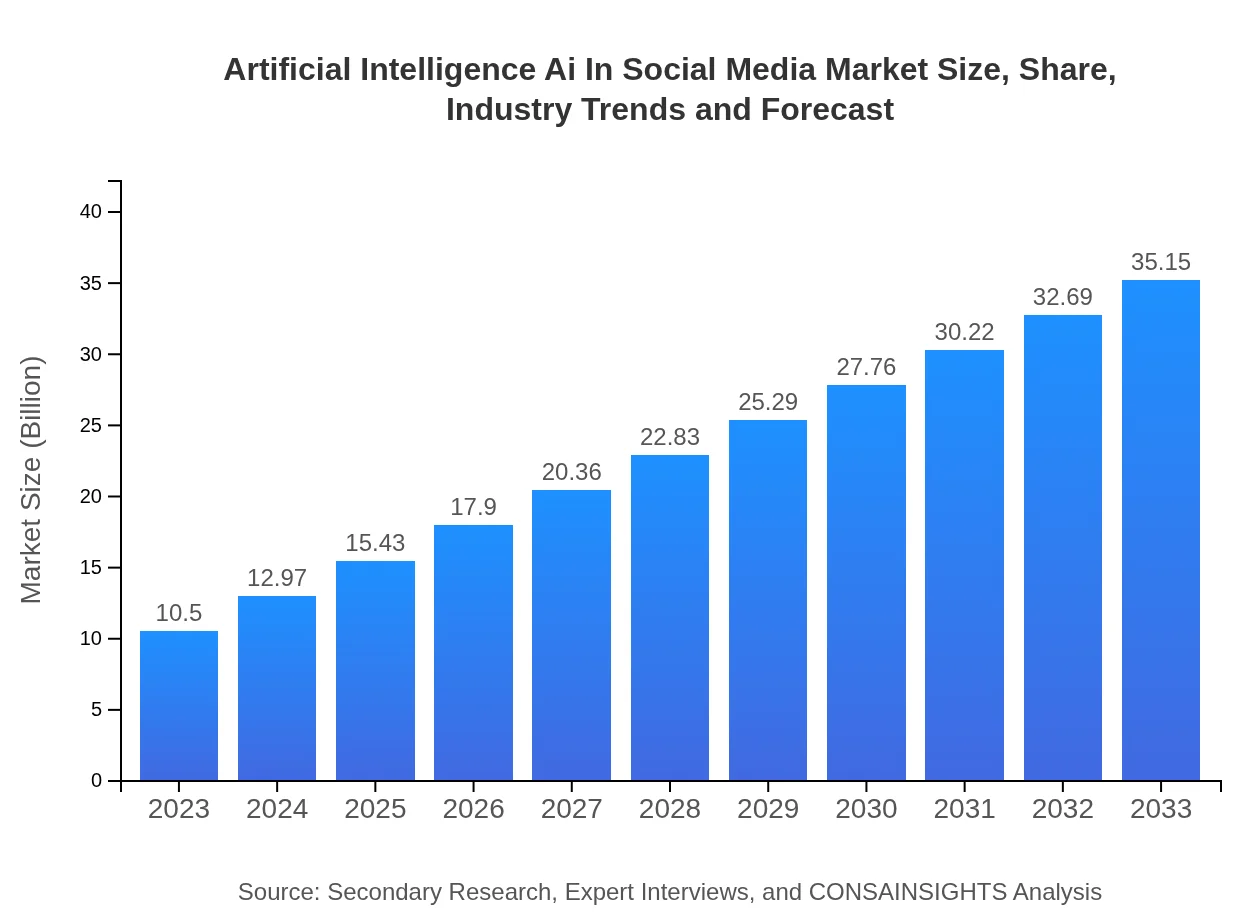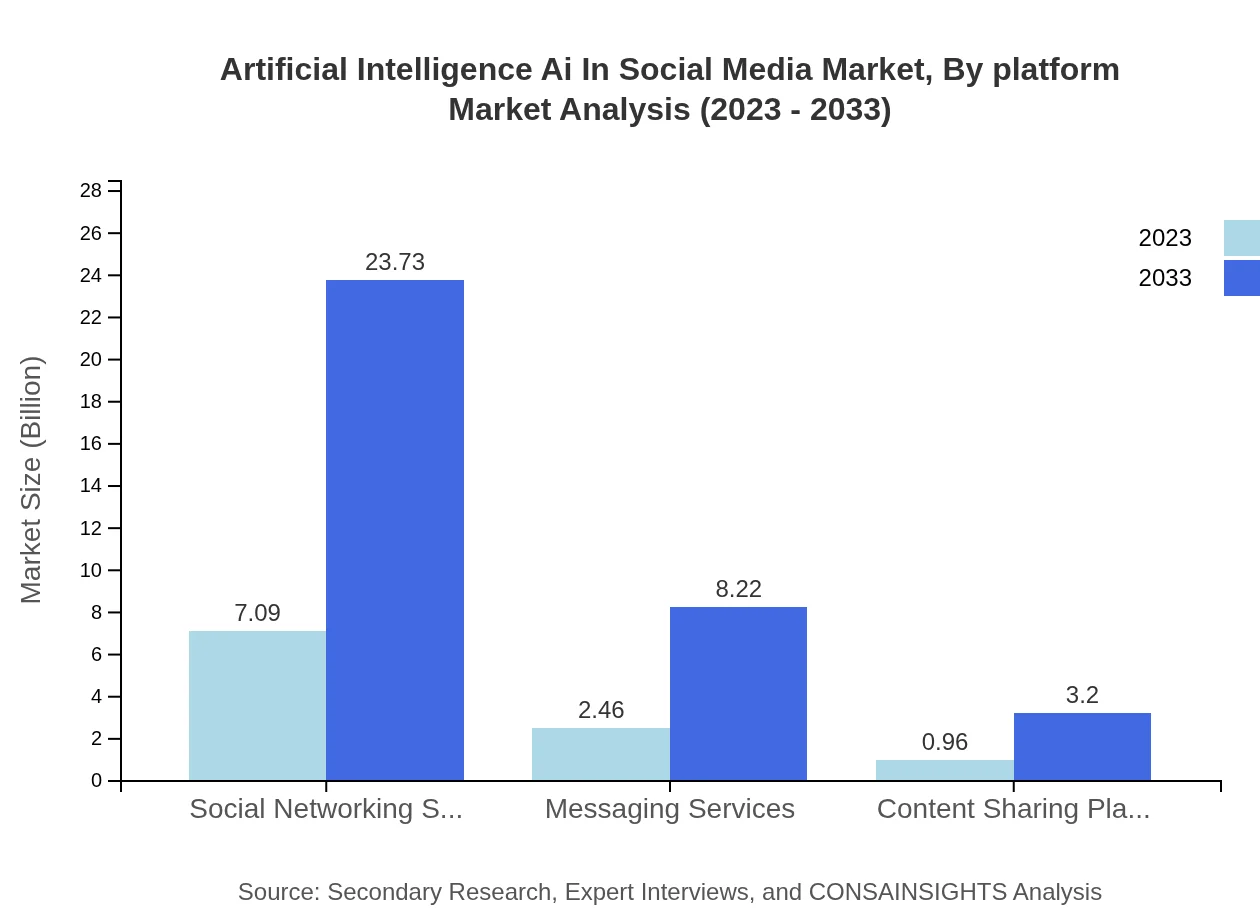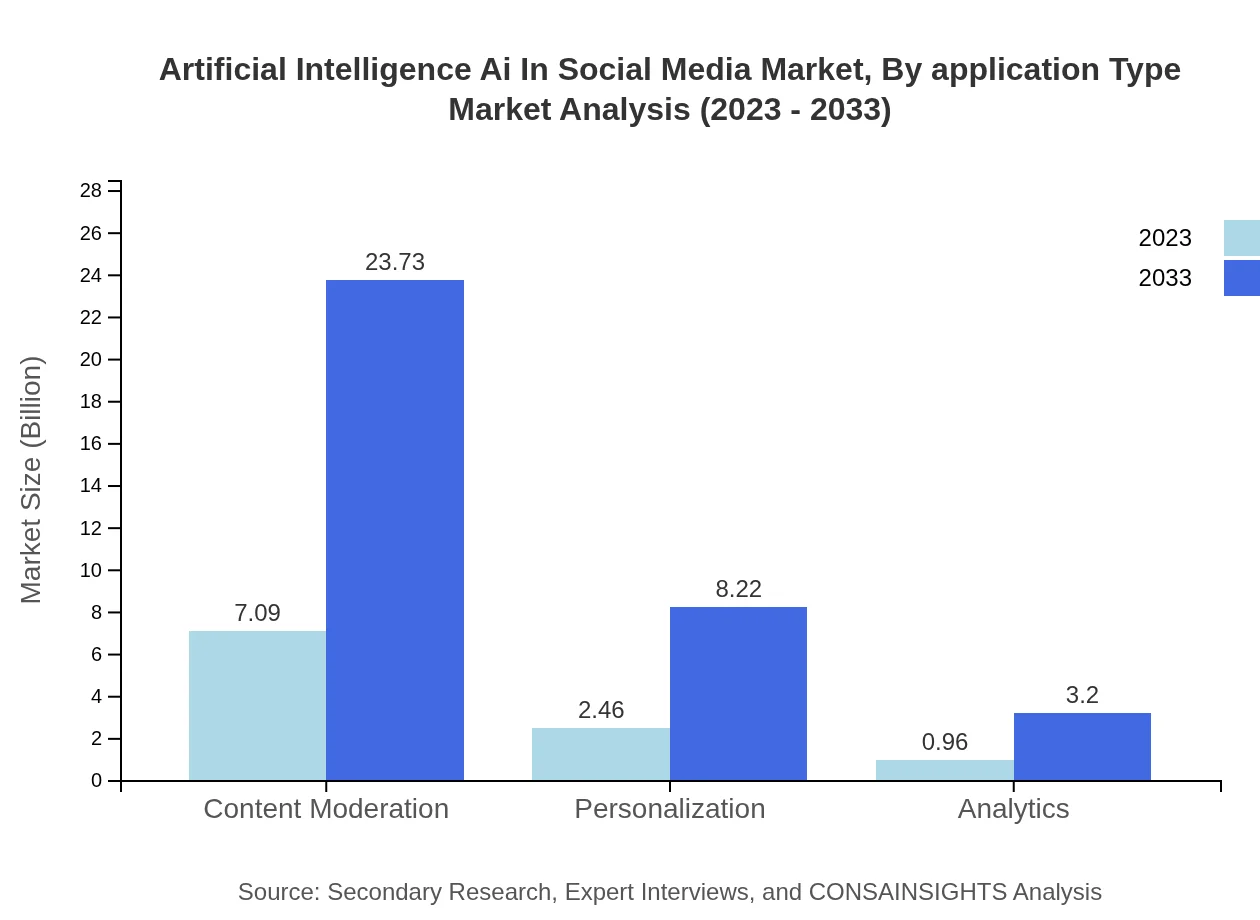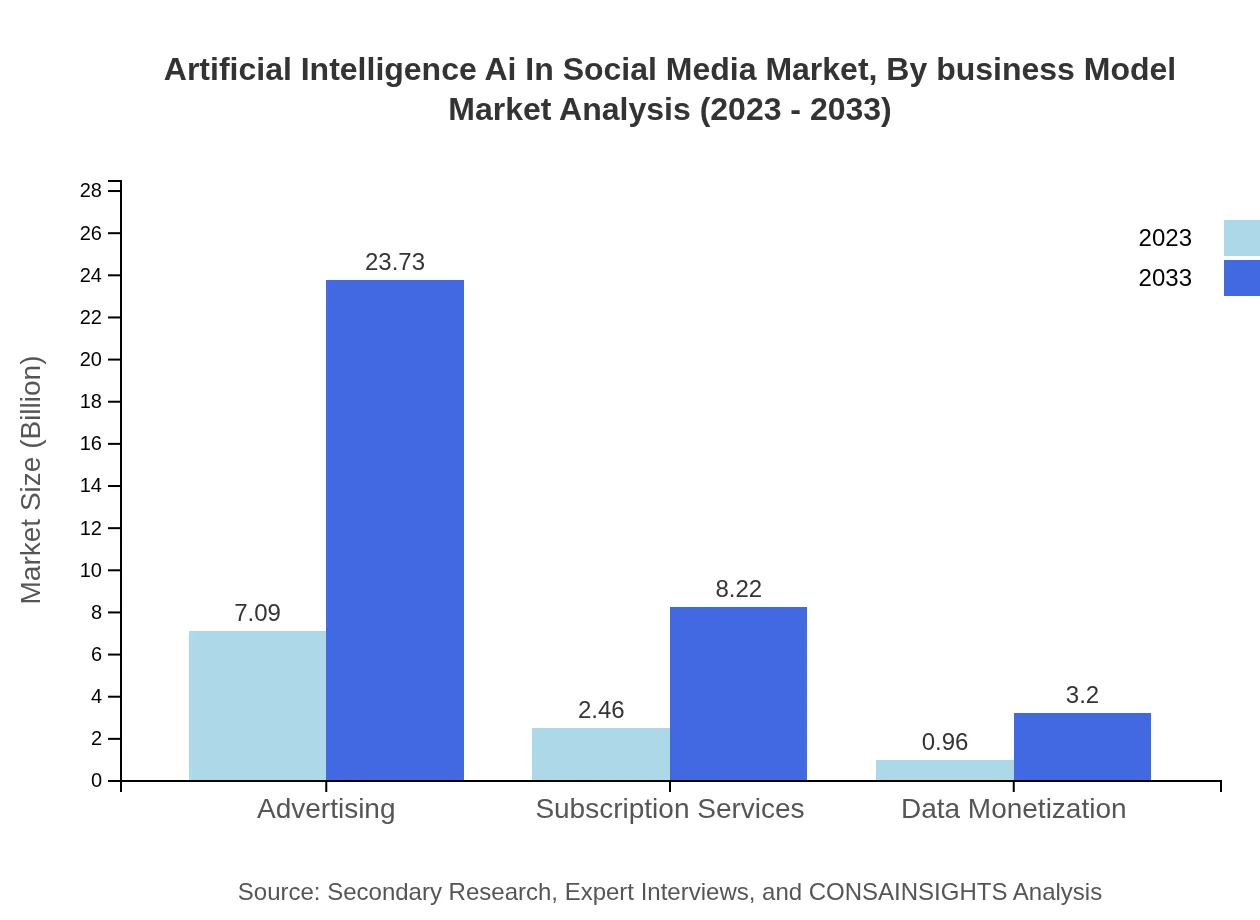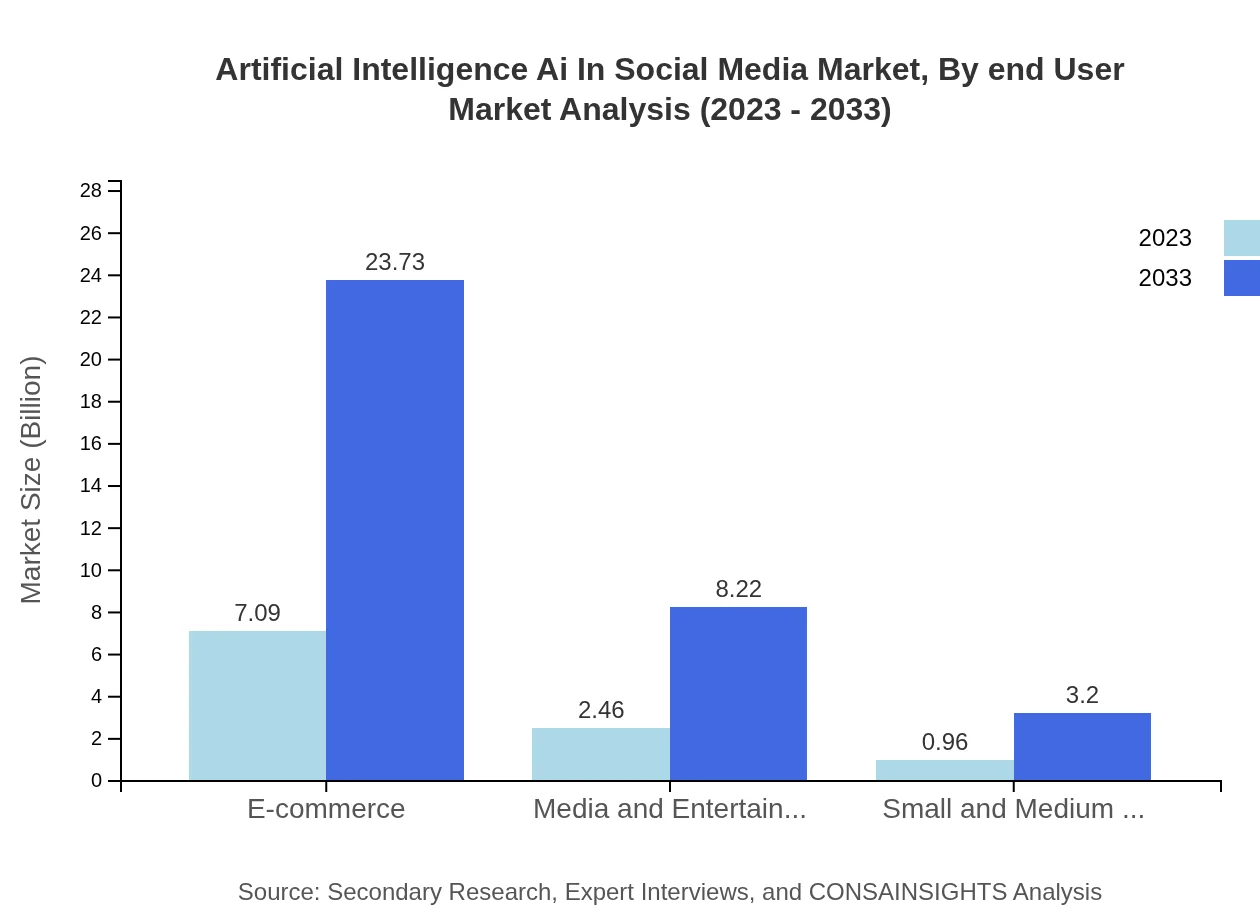Artificial Intelligence Ai In Social Media Market Report
Published Date: 31 January 2026 | Report Code: artificial-intelligence-ai-in-social-media
Artificial Intelligence Ai In Social Media Market Size, Share, Industry Trends and Forecast to 2033
This report delves into the Artificial Intelligence (AI) in social media market, providing insights into market dynamics, size, segmentation, and regional performance, with a forecast from 2023 to 2033.
| Metric | Value |
|---|---|
| Study Period | 2023 - 2033 |
| 2023 Market Size | $10.50 Billion |
| CAGR (2023-2033) | 12.3% |
| 2033 Market Size | $35.15 Billion |
| Top Companies | Hootsuite, Sprinklr, Adobe |
| Last Modified Date | 31 January 2026 |
Artificial Intelligence Ai In Social Media Market Overview
Customize Artificial Intelligence Ai In Social Media Market Report market research report
- ✔ Get in-depth analysis of Artificial Intelligence Ai In Social Media market size, growth, and forecasts.
- ✔ Understand Artificial Intelligence Ai In Social Media's regional dynamics and industry-specific trends.
- ✔ Identify potential applications, end-user demand, and growth segments in Artificial Intelligence Ai In Social Media
What is the Market Size & CAGR of Artificial Intelligence Ai In Social Media market in 2023?
Artificial Intelligence Ai In Social Media Industry Analysis
Artificial Intelligence Ai In Social Media Market Segmentation and Scope
Tell us your focus area and get a customized research report.
Artificial Intelligence Ai In Social Media Market Analysis Report by Region
Europe Artificial Intelligence Ai In Social Media Market Report:
Europe's market is expected to grow from $3.12 billion in 2023 to $10.43 billion by 2033, as businesses invest in AI solutions for better customer engagement and operational efficiency in social media.Asia Pacific Artificial Intelligence Ai In Social Media Market Report:
In 2023, the Asia Pacific market is valued at $2.30 billion, expected to grow to $7.70 billion by 2033, supported by increasing digital transformations and adoption of AI technologies by businesses.North America Artificial Intelligence Ai In Social Media Market Report:
North America, with a market size of $3.43 billion in 2023, is anticipated to reach $11.50 billion by 2033, fueled by advanced technology infrastructure and strong investments in AI and machine learning.South America Artificial Intelligence Ai In Social Media Market Report:
The South American market is projected to grow from $0.19 billion in 2023 to $0.65 billion by 2033, driven by rising internet penetration and the increasing popularity of social media platforms.Middle East & Africa Artificial Intelligence Ai In Social Media Market Report:
The Middle East and Africa market will grow from $1.46 billion in 2023 to $4.88 billion by 2033, driven by an increase in social media usage and regional investments in digital innovation.Tell us your focus area and get a customized research report.
Artificial Intelligence Ai In Social Media Market Analysis By Platform
The AI in social media market, segmented by platform, shows that E-commerce platforms lead with a market size of $7.09 billion in 2023, expected to reach $23.73 billion by 2033. Social Networking Sites, a significant contributor, will remain influential with a market share of 67.51% throughout the forecast period.
Artificial Intelligence Ai In Social Media Market Analysis By Application Type
In application types, Content Moderation holds a substantial market size of $7.09 billion in 2023, with projections placing it at $23.73 billion by 2033. Other application types like Personalization and Analytics are expected to grow commensurately, emphasizing the diverse utilities of AI.
Artificial Intelligence Ai In Social Media Market Analysis By Business Model
The market's business model segmentation indicates a strong emphasis on Advertising, making up 67.51% of the market share in 2023, which is predicted to continue through to 2033. Subscription Models and Data Monetization also present significant growth forecasts.
Artificial Intelligence Ai In Social Media Market Analysis By End User
The end-user segmentation reveals that enterprises (large and small) and social media platforms are the primary users of AI technologies. The rise of small and medium enterprises adopting these tools for competitive advantage is noteworthy, with a market share of 9.1% in 2023 linked to SMB engagement.
Artificial Intelligence Ai In Social Media Market Trends and Future Forecast
Tell us your focus area and get a customized research report.
Global Market Leaders and Top Companies in Artificial Intelligence Ai In Social Media Industry
Hootsuite:
Hootsuite provides a social media management platform that leverages AI to streamline social media marketing strategies, offering analytics and content scheduling capabilities.Sprinklr:
Sprinklr specializes in customer experience management, employing AI for real-time engagement analytics and social media listening to enhance brand communication.Adobe:
Adobe uses AI in content creation and personalized marketing strategies, maximizing engagement through innovative tools in its Creative Cloud suite.We're grateful to work with incredible clients.









FAQs
What is the market size of artificial intelligence (AI) in social media?
The artificial intelligence market in social media is valued at approximately $10.5 billion in 2023, with a projected compound annual growth rate (CAGR) of 12.3% until 2033, highlighting its significant growth potential.
What are the key market players or companies in the artificial intelligence industry in social media?
Key players in the AI in social media market include major tech giants such as Facebook, Google, and Microsoft, as well as innovative startups focusing on AI solutions for digital engagement and analytics.
What are the primary factors driving the growth in the artificial intelligence in social media industry?
The growth in this industry is driven by increasing demand for personalized content, advancements in machine learning algorithms, and the rising need for automated customer service solutions.
Which region is the fastest Growing in the artificial intelligence in social media market?
North America is the fastest-growing region for AI in social media, expected to grow from $3.43 billion in 2023 to $11.50 billion by 2033, indicating a strong market appetite for AI innovations.
Does ConsaInsights provide customized market report data for the artificial intelligence in social media industry?
Yes, ConsaInsights offers tailored market report data that can be customized based on specific goals and requirements of businesses looking to gain in-depth insights into AI within social media.
What deliverables can I expect from this artificial intelligence in social media market research project?
Deliverables include comprehensive market analysis, trends, forecasts, and segmented data insights across various dimensions like geography and market participants.
What are the market trends of artificial intelligence in social media?
Current trends include a rise in AI-driven content personalization, enhanced data analytics for user engagement, and the implementation of AI in marketing strategies across social media platforms.

